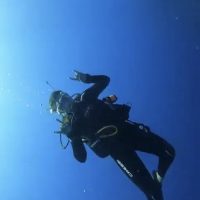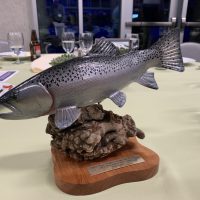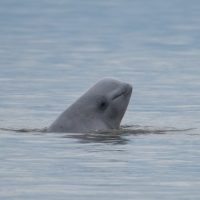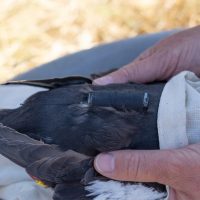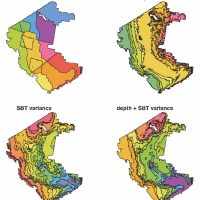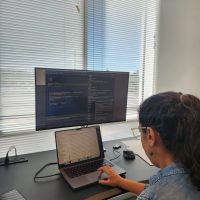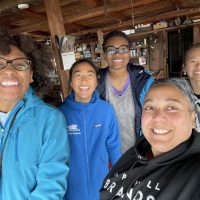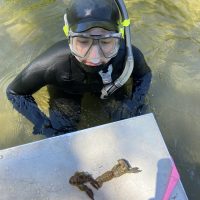Filter Results
New SAFS MS student named Outstanding Graduate of Western Washington’s Marine and Coastal Sciences program
Named as the first Outstanding Graduate of Western Washington University’s Marine and Coastal Sciences program, Amirah Casey has recently joined the Applied Ecology Lab as an MS student, advised by Mark Scheuerell. Amirah shared with us what brought her to SAFS, plus what she is most excited about in this next step in her academic journey.
Watch the WWU video featuring Amirah
Throughout my undergraduate career I had received many encouragements that I should attend graduate school.
Tom Quinn receives Jack Williams Award for Applied Conservation Science
As part of the Trout Unlimited annual awards, SAFS Professor Tom Quinn has received the Jack Williams Award for Applied Conservation Science. Read about why Tom was selected for this award in the write-up below, reposted from Trout Unlimited.
Recently retired from full-time teaching and research at the University of Washington, Professor Tom Quinn deserves massive thanks for the huge body of research and writing on Pacific Rim fisheries and especially on salmon and trout of the Pacific Northwest and Alaska.
Read moreWhy are some protected species failing to recover?
New study uses integrated population models to predict extinction risk for Cook Inlet beluga whales and lend insight into factors limiting the recovery of protected populations.
Sparse monitoring data and persistent knowledge gaps can hamper conservation efforts aimed at recovering depleted wildlife populations. In a new study, researchers from the UW School of Aquatic and Fishery Sciences (SAFS) set out to tackle this issue for federally endangered Cook Inlet beluga whales by developing an integrated population model that capitalizes on all available information to understand factors that may be affecting survival, reproduction, and population viability.
Bird backpacks: GPS tagging of rhinoceros auklets and pigeon guillemots on Protection Island
In an effort to establish a better understanding of the foraging habits of rhinoceros auklets and pigeon guillemots on Protection Island, Liam Pendleton’s seabird research has involved GPS tagging and monitoring of these seabird species to delineate key foraging locations in the waters surrounding the island. Rhinoceros auklets migrate all along the West Coast of the US and Canada, and nest on the same island as pigeon guillemots, featured in a previous article by SAFS.
Read moreAdapting monitoring to a changing seascape: efficiency, flexibility and continuity for bottom trawl surveys
Fishery-independent survey data represents essential information for stock assessment, ecosystem-based fishery management initiatives, and applied ecological research. These data refers to information collected over space and time about populations of marine organisms, such as population abundance and biomass. The data can be used to fit statistical models to obtain multiple products for the assessment and management of marine populations. and can provide a comprehensive and standardized picture of marine populations when collected consistently over time, particularly with respect to gear selectivity and sampling design.
Read moreDirector’s Message: Autumn 2023
So two coastal ecologists and a quantitative environmental scientist walk into a bar ….
Nope, not a joke! It is just the School’s newest faculty getting together for a social hour. That’s right, this past academic year we successfully recruited three outstanding new faculty to our School. This newsletter edition includes a feature on Corey Garza, who arrived in September and is already building up his lab.
Advancing eDNA methods to inform ecological and conservation questions
The use of eDNA methods is a new and exciting area of research. Tania Valdivia, a post-doctoral student in the Whale and Dolphin Ecology Lab, is working on a large marine project under the guidance of Amy Van Cise from SAFS, and Ryan Kelly from the School of Marine and Environmental Affairs (SMEA).
The project focuses on the application of eDNA methods to detect and identify the spatial distribution of marine mammals and their prey in the California Current.
SAFS Cafe returns in Autumn 2023
Returning on Tuesday 10 October at 3.30pm, join your fellow SAFS community for hot drinks, tasty treats, and conversation each week during the Fall Quarter.
Are you a student? Staff member? Faculty? Researcher? Take a break from your day and get to know others working at SAFS. All are welcome!
Tuesdays at 3.30pm in the second floor kitchen area near the patio.
Marine science mentoring over the summer at FHL
Spending the summer at Friday Harbor Labs (FHL), SAFS grad student Chris Mantegna mentored four students – two as part of the NSF-funded Research Experience for Undergrads-Blinks (REU) program and two as part of the Doris Duke Conservation Scholars Program (DDCSP). During the program, students get to collaborate on a research project with their scientist-mentor to build marine research skills.
Specifically geared towards enhancing diversity within the marine sciences, the program welcomes students from underrepresented groups.
Summer field season with the Freshwater Ecology and Conservation Lab
Claire Vaage, a masters student in the Freshwater Ecology and Conservation Lab advised by Julian Olden, spoke with us about her summer field season in Central Oregon.
Spending 5 weeks during this summer in Oregon, I led a research team of two to four people at a time. Each day we conducted snorkel surveys and collected samples of freshwater macroinvertebrates and vegetation.
